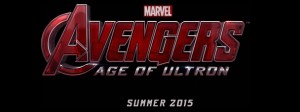 We are at peak Avengers: Age of Ultron backlash. The flick hasn’t been reviewed with nearly the nerd boner that the first Avengers movie got… and on some level, I agree. The first Avengers was better. That doesn’t automatically make AoU bad, but I can see how it would disappoint some people. You know, people who didn’t live through a time when, across a three-year span of time, the only comic book movie we got was Howard the Duck.
We are at peak Avengers: Age of Ultron backlash. The flick hasn’t been reviewed with nearly the nerd boner that the first Avengers movie got… and on some level, I agree. The first Avengers was better. That doesn’t automatically make AoU bad, but I can see how it would disappoint some people. You know, people who didn’t live through a time when, across a three-year span of time, the only comic book movie we got was Howard the Duck.
But the backlash has strengthened, for some, into legitimate anger. Consider this 4,200 word complaint that AoU is a failure on almost every level that one would want in a “popcorn movie.” Sady Doyle, the author, says she likes popcorn movies – big ‘splosions, giant robots, “pure, overwhelming spectacle.” She says she likes ’em big and dumb, kids. So then we’ll be on her side as she tears the flick apart, piece by piece, as useless.
She’s wrong, of course. Let’s figure out why! And I got my own 4,000 words to do it, so buckle up!
The nuts and bolts of Doyle’s argument are that Age of Ultron is too packed with characters, “product placement” for other Marvel Studios projects, and, ultimately, sexist in the handling of Black Widow.
She makes certain points that I agree with. Some of the stuff writer / director Joss Whedon and producer Kevin Feige plugged into the flick to tie it into the rest of the Marvel Cinematic Universe did seem forced. Thor running off to meet Dr. Selvig to take a dip in a magic hot tub that I don’t remember ever seeing before just to see the Infinity Gauntlet seemed like it came out of left field. And Falcon’s little comment that he was working on a “missing person’s case” yanked me out of the flick until I remembered that Captain America was still looking for The Winter Soldier.
But on some level, this is necessary. Doyle might be a fan of “popcorn movies,” but AoU is something different: it is a comic book movie. In the purest sense of the word: every story is part of a larger story that, if Kevin Feige does his job right, will never end.
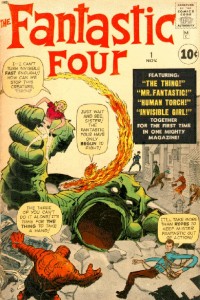 Someone – probably Marvel Editor-in-Chief Axel Alonso, but whatever – has called the Marvel Universe the longest-running, non-stop, sequential story told in human history. It starts with Fantastic Four #1 in 1961 and, well, apparently ended with Secret Wars #1 last week. But the point is that, any given package of storytelling is a chapter. It should function with a beginning, a middle, and an end… but with the assumption that that “end” is not ultimate, and the beginning is not, “Let There Be Light!” The overall story will continue in the next chapter, and the previous chapters are important to the continuing story.
Someone – probably Marvel Editor-in-Chief Axel Alonso, but whatever – has called the Marvel Universe the longest-running, non-stop, sequential story told in human history. It starts with Fantastic Four #1 in 1961 and, well, apparently ended with Secret Wars #1 last week. But the point is that, any given package of storytelling is a chapter. It should function with a beginning, a middle, and an end… but with the assumption that that “end” is not ultimate, and the beginning is not, “Let There Be Light!” The overall story will continue in the next chapter, and the previous chapters are important to the continuing story.
Doyle complains that AoU is so stuffed that most characters get short shrift in the character arc department. And she has a point, but only if you forget the fact that these characters’ arcs span multiple movies. She complains that Tony Stark’s arc in Age of Ultron is cut short, apparently ignoring the fact that his first character arc, from selfish cad to legitimate, self-sacrificing hero, spanned three movies: Iron Man, Iron Man 2 and Avengers. His current arc started in Iron Man 3, will continue through Captain America: Civil War, and probably go through The Infinity War, ending in another act of sacrifice that brings his story to a close. Because Marvel Studios will kill Tony Stark, because my guess is that Ike Permutter would rather eat a bug than give Robert Downey Jr. cab fare home, let alone a percentage of the gross. But I digress.
Besides, this movie’s not called Iron Man 4 or Thor 3 or Ant-Man 1/2, it’s called Avengers, and the team has a complete arc. They start as a complete, finely-tuned unit. They are tested by being shown their fears by Scarlet Witch. Cracks begin to show. Members question their continued involvement. They confront what the team means, and learn that it is bigger than the current members (“If you walk out that door, then you are an Avenger.”) And ultimately most individual members of the team peel off, knowing that the concept of The Avengers can encompass anyone committed to that mission, and therefore it cannot be destroyed. Which is a lot of words to say, “There is no ‘I’ in team.”
But there is an “i” in “Black Widow.” So what the hell, let’s talk about her.
Again: AoU is part of a story that never ends. Any character’s arc crosses multiple properties and media. It’s part of what makes superhero comic book fans love the medium… and it’s the reason why almost everybody has completely misconstrued Black Widow’s character arc in AoU as sexist and lacking agency. They’re not considering the character across all her appearances.
Doyle, too, gets this wrong. In fact, she specifically peels away from her general disdain for the movie to specifically address Widow:
But when you’re doing all your character work with shortcuts, and you have to write a shortcut for your female character, what do you come up with? She’s that one dude’s girlfriend, obviously, is a time-honored shortcut, used or teased by every Marvel writer who’s put Black Widow in a movie — as a woman, she’s an Other, and a sexual object, and therefore must be deployed as a potential or actual sexual reward for a male viewpoint character, rather than being a viewpoint herself… If you want to deepen your female character past being a sexual object, in a movie that has no time or patience for anything resembling “depth,” what conflicts do you give her? Well, women have babies, right? Women want babies. Okay. She can’t have babies. She’s sad because she can’t have babies. There you go! Depth established!
I mean, it’s disgusting. Defining your female character’s motivation solely around the Betty Crocker axis of “wants boyfriend” and “wants babies” is 100% disgusting…
I never thought I’d be the kind of person who believed that a crime against feminism was less important than a crime against storytelling, but in this case, they’re so interconnected that it’s hard to tell the difference. When you can’t write, you can’t write women.
And when you can’t think in terms of stories that span multiple chapters, you can’t understand what the fuck you’re talking about.
Now might be the time when some might start sputtering, “MANSPLAINING,” but you’re wrong. Because I generally felt the same way about Widow’s arc walking out of AoU the first time. I had to be set straight by a woman. One who loves comics and pays more attention than me or Doyle.
The theory that follows is not mine. It comes, in whole, from my co-host and co-editor Amanda, who is much smarter than I am. She first presented it in the AoU episode of our podcast, which you should listen to not just to hear it from the mouth of the woman who puzzled it out, and not just to hear her change the minds of the three dudes on the show, but because it’s really fun and a lot less judgmental than this editorial is about to become.
So why am I writing it? Because she has better things to do than deal with people who are wrong on the Internet.
—————————————-
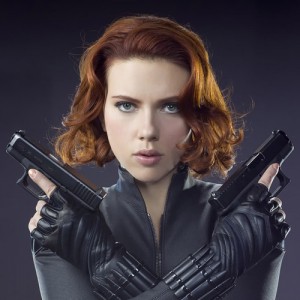 So: the Widow. Doyle and others are upset that Whedon showed her seemingly showing feelings toward Banner. They’re pissed that she tells him that she is willing to leave the Avengers to be with him if he quits. They’re angry that she said that she was sterilized in the Red Room, and that she then calls herself a monster. Let’s start there.
So: the Widow. Doyle and others are upset that Whedon showed her seemingly showing feelings toward Banner. They’re pissed that she tells him that she is willing to leave the Avengers to be with him if he quits. They’re angry that she said that she was sterilized in the Red Room, and that she then calls herself a monster. Let’s start there.
Remember: AoU is not a movie that takes place in a vacuum. It is the eleventh part of a story that began in 2008 with Iron Man. Which means Widow’s character needs to be considered in the entirety of that story, which started for her in 2010’s Iron Man 2, and has spanned four movies.
Think about when we first saw Widow in Avengers. She was tied to a chair with her life being threatened… and yet she was still in total control. Later, she is verbally abused by Loki, but still: she’s the one who winds up having the power in that exchange. Why? Because Whedon shows us that Widow is a master manipulator. Her superpower, if she has one, is the ability to make men do what she wants.
We learn early in Avengers that Widow is tasked by Nick Fury to wrangle Banner to the team and keep him under control. We are also shown that he scares the living hell out of her, presumably because he is a dangerous primal force that she doesn’t know how to control.
So, two questions:
- What makes you think that Widow’s mission has changed between the two movies?
- What makes you think that Widow was unable to find a way to control Banner and the Hulk?
My partner Amanda believes (and she has convinced me) that Widow is always shown to be focused on her mission. We’ve seen it over and over again: she allows herself to be objectified by Stark to stay close to him and try to gain access to his technology in Iron Man 2. She faces Banner in Avengers despite being terrified. She downloads data in Winter Soldier despite jeopardizing Captain America’s battle against Batroc.
Do you really think that person would ever consider chucking it all to go on the run with Bruce Banner? Or is it more likely that she would tell Bruce that to maintain his confidence and keep herself close to him to maintain influence over him?
And regarding The Hulk: in The Incredible Hulk, we saw Hulk unwilling to attack Betty Ross, who Banner loves. This relationship even gets subtly namechecked in AoU – the Hulkbuster armor is nicknamed “Veronica.” Why? Because Hulk loves Betty. This behavior by The Hulk would be common knowledge to SHIELD, so Natasha would know this. It should be common knowledge to viewers. Or at least ones who understand that continuity matters.
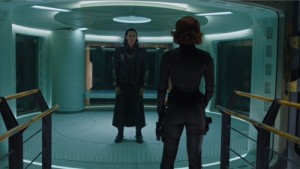 Let’s remember that, in Avengers, we saw Natasha Romanov lie to and trick a god – and not just any god, but the god of tricks and lies – in order to complete her mission. So what’s more likely: that she would fall loopy in love with Bruce Banner and quit The Avengers? Or that she would make Banner fall in love with her to make him stay on the team, and make The Hulk easier to control?
Let’s remember that, in Avengers, we saw Natasha Romanov lie to and trick a god – and not just any god, but the god of tricks and lies – in order to complete her mission. So what’s more likely: that she would fall loopy in love with Bruce Banner and quit The Avengers? Or that she would make Banner fall in love with her to make him stay on the team, and make The Hulk easier to control?
Tim McIntire, a guest on our AoU podcast, argued that we can believe Natasha really loves Bruce because Captain America said it, and he never lies. Of course he doesn’t, but he can only be truthful about what he believes. Do you think Natasha would have told Cap her mission regarding Banner? Do you believe that Captain America would condone acts of emotional and sexual manipulation against a trusted teammate? Again: she tricked Loki; fooling a high school graduate from 1941 who tries to see the most noble in people would be child’s play.
So: the “I’m sterilized” scene that Doyle and half the rest of the free world has obsessed over. We see Banner get out of the shower and threaten to leave the team. Then Natasha tells him about being sterilized in the Red Room before calling herself a monster. The prevailing anger seems to channel from Whedon having Widow call herself a monster because she is unable to have children.
But think about that scene through the lens of Natasha’s mission to keep Hulk on the team and control him.
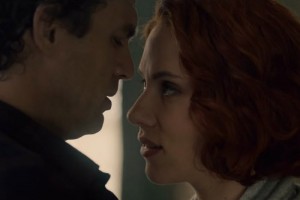 Banner says he wants to leave, and that his motivation for this is based on Hulk’s uncontrolled rampage after Scarlet Witch’s mind control. He wants to run somewhere remote, because he is afraid that Hulk will hurt someone innocent. It is right at this moment when Natasha moves from the flirting she’s done until now to actual physical contact – she almost kisses Banner. And she immediately says that she’s coming with him.
Banner says he wants to leave, and that his motivation for this is based on Hulk’s uncontrolled rampage after Scarlet Witch’s mind control. He wants to run somewhere remote, because he is afraid that Hulk will hurt someone innocent. It is right at this moment when Natasha moves from the flirting she’s done until now to actual physical contact – she almost kisses Banner. And she immediately says that she’s coming with him.
Why would she do that? Because she’s suddenly chucked everything that she’s ever believed in to hang out with a science geek in some Unibomber shack? Don’t be dense. She did it to reinforce Banner’s affection for her (if Scarlett Johansson threw herself into my arms and asked my to run a frontal assault on Fort Knox, my first thought would be where I might find a tank), and change the game: if he runs to stay away from innocents, she will still be there. If Banner’s goal is to stay away from people he might not be able to stop himself from hurting, Natasha, who he has feelings for, will be right there in the line of fire.
So Banner, believing that Natasha is showing intentions of leaving her life and shacking up with him in East Buttfuck, tries to convince her to let him go. He does this by trying to convince her that they have no future together. He waves at Hawkeye’s home, where his wife and children live, and tells Natasha, “I can’t have this… kids… do the math, I physically can’t.” That’s when she tells him about her sterilization, how it made her a more efficient killer, and therefore “a monster.”
Two things here: a lot of anger has come from people interpreting that Widow calls herself a monster because she can’t have children. But those people are completely ignoring that, between talking sterilization and “monster,” she says that infertility, “makes everything easier. Even killing.” She calls herself a monster because she was raised and trained as a killer. She has killed many people, possibly today.
And second: we submit that she only brought up infertility as a counter to Banner’s argument that she should leave him because they can’t have a family. The goal was not to denigrate herself, it was to make Banner believe that he couldn’t achieve his goal of disappearing and not being a danger to anyone. She is effectively saying, “We can’t have kids? Don’t care. Here’s why. Your argument therefore has zero effect on me, and I will be there the next time you Hulk out. Escape from this problem is not an option.”
And here’s something that my partner Amanda just brought to my attention regarding this sequence: this is where we’re really shown that Natasha and Clint are best friends. We see Clint’s children calling for “Aunt Nat.” We see Clint’s wife Laura prepared to name her daughter after Natasha. We are shown that Natasha is, really and truly, the best friend that Clint has… and yet Clint has no idea that Natasha supposedly has feelings for Banner? Really: we see Laura gently mocking Clint over the fact that he seems to have no idea that Natasha might like Bruce romantically.
Think about that. We “learn” that Natasha is into Bruce from observations from Captain America and Laura. But those are observations from the outside. Nobody ever says, “Nat and Bruce? Yeah, she told me that she’s got a chick boner for him.” And that includes Clint – her self-confessed best friend – whom one would suppose she might try to work through her supposed feelings about a man who, when excited, becomes a rampaging green atom bomb with a penis the size of a half keg.
So are we to believe that Cap and Laura can see the real truth (as inferred through the behavior of someone who can lie effectively to Loki) while Natasha just sorta fails to mention her “deep true feelings” about Banner to her best friend in the whole world? Or are we to believe that Natasha is working, and might not have any real true feelings to confess to her best friend? That’s one hell of a question that no one seems to be asking!
Anyway.
The other scene that has people in a twist is after Widow is captured by Ultron, and “rescued” by Banner. Doyle doesn’t reference this, but enough others have mentioned it online that I want to. The argument is that this makes Widow nothing but a “damsel in distress,” and weakens the character. This is bullshit.
First of all, this is an action / war story. And in those stories, people are sometimes captured. Hell, in Avengers, Hawkeye was not only captured, but completely robbed of any agency, and shown so emasculated by the experience that not only was he potentially unable to function afterwards, but it even affected him in AoU, three years later (when he stopped Scarlet Witch before she could hex him, he specifically referenced being mind controlled in Avengers). And yet nobody other than Jeremy Renner’s agent shrieked that it made Hawkeye less of a man.
So this time it was Widow’s turn. But let’s remember that we’ve seen her not only captured before, but in a way that would make a bondage pervert wear out his Avengers DVD by constantly rewinding the same spot. Here, sure, she’s thrown in a cage… but from that cage she is able to signal Hawkeye as to Ultron’s location… at the very least. But I’ll get back to that in a second.
So let’s talk about that cage Widow’s in. You know, that cage where she builds a telegraph that can signal halfway around the world from shit she was just carrying. You really think that she couldn’t have picked that lock? Hell, in Avengers, she managed to escape from being tied to a chair in front of five or six guys with guns pointed at her.
And here’s another question: why do you think Banner was the one who came to rescue her?
I mean, we see Banner sitting on the Quinjet during the fight against the twins, waiting to be specifically given the “Code Green” to Hulk out and move into action. It’s easy to presume that that’s the standard operating procedure when you’ve got a guy who’s the human equivalent of a weapon of mass destruction. So why is Banner sent into the belly of the beast? Particularly when Hawkeye – her best friend, and presumably trained in escape methodology – is around? Let’s remember that Banner showing up to break Widow out is the first thing we see of the final battle against Ultron – we literally go from Captain America talking about the plan, to Banner showing up outside Widow’s cell.
Our theory (and this is just a theory, as there is nothing in the theatrical cut to support this)? Widow told Hawkeye in her telegraph message to send Banner. Why? Because Banner has shown he is reticent to become Hulk when innocents are around. Therefore, he would be unlikely to voluntarily do so in a city full of people, particularly if she knew that Ultron planned to yank it a couple miles into the sky. So I think she asked for Banner so that she could have a chance to convince him to join the battle.
Remember: here’s the dialogue immediately after Banner opens Natasha’s cell:
Natasha: So what’s our play?
Banner: I’m here to get you to safety.
Natasha: But the job’s not finished.
What part of that exchange leads you to believe that Widow is a damsel in distress, pining to be rescued by her big strong loverman? Her first reaction? We have work to do. That’s not exactly swooning over Prince Charming.
Banner continues the conversation, showing that he believed her earlier assertions that she was willing to run away with him. She asks him one more time if he’s “going to turn green,” and when he refuses? She says, “I adore you,” and kisses him for the first time… and then pushes him into the pit to turn him into Hulk, saying, “But I need the other guy.”
There are volumes in those nine words. Let’s start with, “I adore you.” Note that she doesn’t say, “I love you.” This cannot be an accident. This is the kind of word-mincing that a high school poetry geek uses to keep his girlfriend around while leaving himself just enough equivocation to be able to pull new tail without having technically lied.
And then there’s, “But I need the other guy.” Not “we” need the other guy, but “I.” This places her actions completely within her own agency. She has chosen to place her needs over Banner’s, and her need is to complete the mission. Also note that this is the only time in AoU where Hulk is referred to as “the other guy,” unlike in Avengers, where the term constituted about ten percent of the running time. And it hammers home that Widow really sees Banner and Hulk as two different people, the way Banner saw himself three years ago… and she’s choosing “the other guy.”
I don’t have any superpowers. But even I know that if someone told me, “I adore you, but I need the other guy”? I just got fucking dumped. That’s not a woman who doesn’t have agency in her relationship. Jesus, Hulk probably rode that Quinjet to the nearest bar to mope.
Again, all of this speaks volumes, and none of them are about a swoony girl who can’t take care of herself and who is blinded by the kind of love you only see in a John Cusack flick. No, this Black Widow is a super spy whose “superpower” is manipulation, and who used that power to keep Banner on the team. All other objectives were secondary. I have no doubt that Natasha is fond of Banner – hell, he’s a nice guy! – but over the course of four movies, she’s manipulated smarter, more dangerous people than Bruce to achieve her mission. Why would Bruce be any different?
And we submit that that is why Hulk turned off the viewscreen in the Quinjet when Widow tried to convince him to come back. Because he knows that she doesn’t love him, and he knows that he cannot trust her. She’ll never come to find him – hell, the movie ends with her learning a possible location of the Quinjet… and then moving ahead with her job to train new Avengers. She doesn’t chase him down, she doesn’t start asking for the most likely locations near the crash site where Banner might be, she just does her job.
That’s not a woman who’s some “dude’s girlfriend,” or shattered by the fact that she can’t have children. That’s a fully actualized woman with a job to do who’s in total control at all times. She’s a character who’s actually a middle finger toward all those dudes’ girlfriends who really want to be mommies. She’s a badass… and Doyle? You missed it.
But what the hell; so did I. Only Amanda got it, because again: she’s much smarter than I am. But it’s all there; if either Doyle or I had taken the time to remember that we were watching a chapter in an ongoing story instead of just a single movie, we’d have gotten it.
And you can argue that that’s a failure in the writing or the directing or the editing, and maybe you’re right. But if this happened in a comic book, I’d have gotten it. Because I have been trained to understand that any given issue is but a part of a neverending story. It’s part of why I love comics…
…and it’s part of why there’s so much “Marvel product placement” in these movies. Because none of us have been trained to watch movies in the way that we read comics. We need to be shown, and constantly reminded, that all of these Marvel movies and TV shows are part of a single story. We need to be trained.
And until we are? Unless they’re lucky enough to have a smart woman around to set them straight, people are gonna see nothing but a popcorn movie that isn’t a complete story, and misconstrue huge parts of it. And thanks to the Internet, they’re gonna write about it.
 Podcast RSS Feed
Podcast RSS Feed iTunes
iTunes Google Play
Google Play Stitcher
Stitcher TuneIn Radio
TuneIn Radio Android
Android Miro Media Player
Miro Media Player Comics Podcast Network
Comics Podcast Network